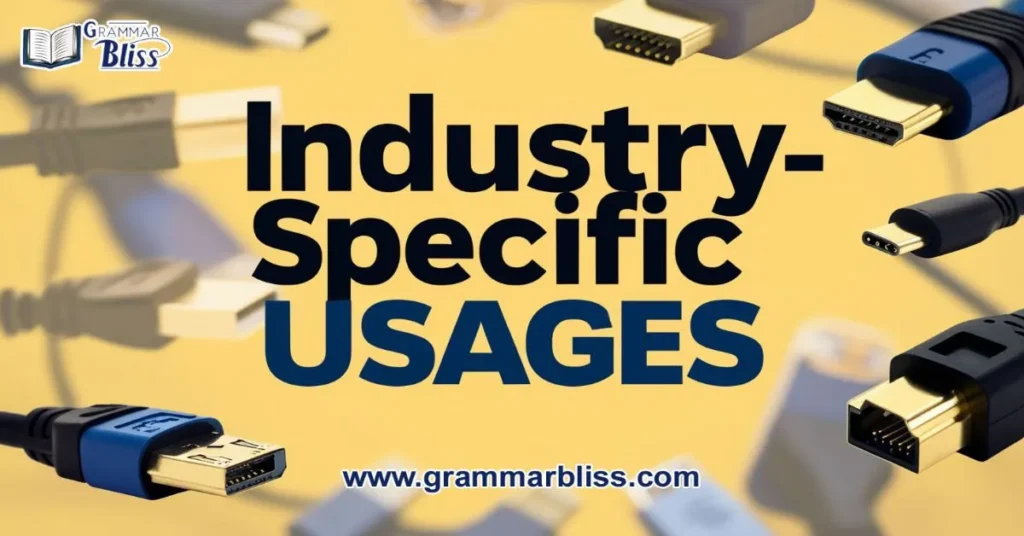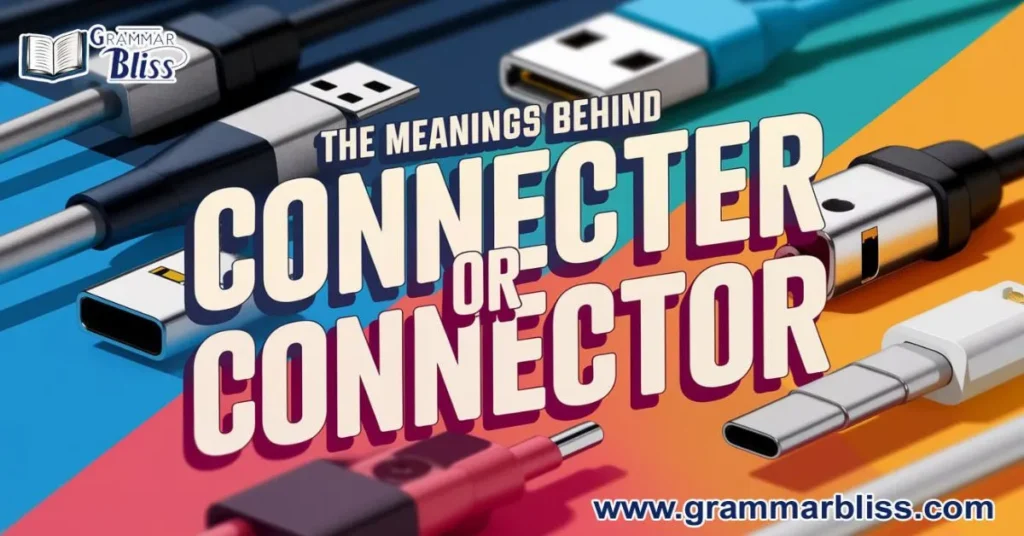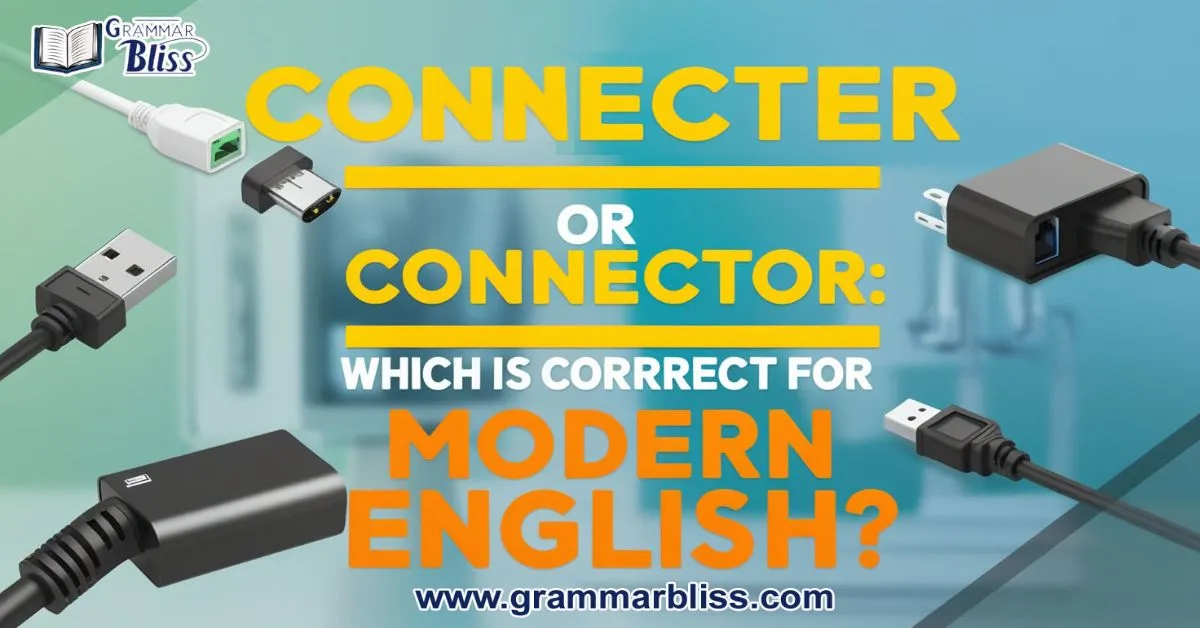When it comes to correct spelling in English, certain words can confuse writers, especially when there are variations like “connecter” or “connector.” While both spellings have been used historically, “connector” is the preferred spelling in modern English.
This is due to the evolution of the language and the process of standardization over time. Understanding the etymology and linguistic trends behind these words helps clarify their correct usage. In this article, we’ll explore the historical spelling differences, language shift, and the current usage of “connector”.
We’ll also look at how style guides like the Chicago Manual of Style and Merriam-Webster help define word choice in technical writing and beyond.
Quick Summary
The terms “connecter” and “connector” both refer to a device or component that joins two things together. However, “connector” is the modern, standard spelling and is widely used in both technical and everyday contexts. On the other hand, “connecter” was once a common variant, but it has since become largely outdated due to the simplification of English and the influence of language standardization efforts.
Read: available-immediately-to-start-work-why-it-matters/
Understanding the Basics
To better understand why we use “connector” today, it’s essential to first define both terms.
A connector is a device or part that links two objects, making it possible for them to function together. For example, USB connectors, HDMI connectors, and network connectors are all types of connectors that allow devices to communicate or share data. The connector plays a crucial role in ensuring data transfer or electrical connection.
On the other hand, “connecter” is simply an older variant of the word with the same meaning. While it might occasionally appear in older historical texts, it’s no longer the preferred choice in modern English writing. The word “connector” has become the standardized term because it aligns better with current language rules and the general trend toward simplification of English.
Spelling Overview
In the past, the spelling of words in English wasn’t always consistent. “Connecter” was once widely used, but over time, language standardization led to the preference of “connector”. Spelling variations like “connecter” were more common in earlier stages of the English language, especially during the period of Middle English.
This language shift toward more consistent spelling forms is part of a larger trend in English, where many historical spelling variations have been simplified to make language learning and usage easier. Today, “connector” is the go-to form, and it’s the version you’ll find in the Merriam-Webster and Oxford English Dictionary, the two most respected dictionaries.
Historical Background and Etymology
To understand why “connector” is the dominant form today, we need to look at its origin. Both “connector” and “connecter” trace back to the Latin roots of the verb connectere, meaning “to bind together.” This Latin verb was the foundation for many modern English words related to joining or linking things.
During the Middle English period, the word was spelled in various ways. Early English had multiple word forms, and connecter was one of them. However, as language evolution continued, English speakers began to favor more consistent and simplified forms of words, which ultimately led to the rise of “connector” as the preferred version. The process of language simplification is a common trend in the development of modern English.
Modern Usage Insights
In contemporary English, “connector” is far more prevalent than “connecter”. Whether you’re reading a technical document, a user manual, or an informational article, you’re most likely to encounter connector rather than connecter.
The term is especially common in technical writing, where clarity and precision are essential. Whether discussing USB connectors, network connectors, or HDMI connectors, connector is the word of choice. It’s also the version used in popular style guides, such as the Chicago Manual of Style and the AP Stylebook.
Industry-Specific Usages

The term connector is particularly important in industries that deal with communication devices, electrical wiring, and mechanical connections. In fields like engineering, technology, and electronics, connector is used to describe the physical components that join parts together, such as USB cables, network connectors, or electrical connectors.
Though “connecter” may appear in older publications or specific regional texts, connector has become the industry standard. Technical writing demands consistency, and connector aligns with modern language trends that prioritize clarity and precision in communication.
Learn: thank-you-for-the-explanation-a-simple-phrase-with-big-impact/
Linguistic Shifts Over Time
Language is always changing, and over time, the English language has undergone many shifts. One significant change that led to the decline of “connecter” was language simplification. As English evolved, speakers and writers sought ways to make words easier to spell and pronounce. This language shift has resulted in the standardization of spelling, where certain word variants were eliminated in favor of simpler, more streamlined forms.
The decline of “connecter” and the rise of “connector” are part of this broader linguistic trend. The simplification of English spelling was influenced by dictionaries and style guides that aimed to bring consistency and clarity to the language. Merriam-Webster and the Oxford English Dictionary both support “connector” as the proper form, reinforcing its dominance in the modern lexicon.
The Meanings Behind “Connecter or Connector”

Both “connector” and “connecter” refer to something that connects two things together. While the meanings of these words are the same, their usage is not. “Connector” is the term that has evolved to be the more common word form in contemporary English.
Connector is often used to describe a physical or metaphorical link between two things. For instance, in technology, a USB connector is a physical device that enables data transfer between a computer and a peripheral device. Metaphorically, a connector could refer to someone who brings people together, such as a networker or a mediator.
Connecter, while still meaning the same thing, is an older variant and no longer used in everyday English. Its use has become outdated due to language reform and simplification trends.
Preferred Usage: “Connector or Connecter”?
In modern English, “connector” is the preferred usage. It’s the standard spelling that appears in major dictionaries, technical documentation, and style guides.
“Connecter” is rarely used today and would be considered incorrect in professional or academic writing. It is seen as a historical variant, and dictionaries such as Merriam-Webster and the Oxford English Dictionary confirm that connector is the correct and most widely accepted form.
Why and How “Connecter” Became Outdated?
The main reason “connecter” fell out of favor is the trend toward simplification of English. As language standards were formalized, and language guides and style manuals became more influential, the standardization of spelling led to the preference for connector over its older variant. Additionally, the simplification of English syntax helped streamline words like connector, making them easier to use and understand.
Comparative Analysis
The shift from “connecter” to “connector” is not unique. Many other words in English have undergone similar transformations. Consider words like “advisor” versus “adviser” or “adapter” versus “adaptor”. These variations reflect language change and word evolution as speakers and writers opt for simpler, more consistent forms.
This trend is not only seen in American English, but also in British English, as language standardization efforts have had a global influence. Dictionaries and style guides like the Chicago Manual of Style and the AP Stylebook continue to emphasize consistency and clarity in spelling.
Influence of Dictionaries and Style Guides
Both Merriam-Webster and the Oxford English Dictionary are authoritative sources that have shaped how we use words in modern English. These dictionaries recognize “connector” as the correct and standard spelling, reflecting the changes in language that have taken place over time.
Additionally, style guides like the Chicago Manual of Style and AP Stylebook guide professional writing and recommend “connector” as the proper form. They also stress the importance of clarity and consistency in writing, making connector the clear choice for technical writing, academic papers, and other professional contexts.
Examples of “Connector” in Modern Context
Today, connector is a word you’ll see in countless contexts, especially in technical and everyday situations. Whether it’s an HDMI connector linking a television to a media device, a network connector enabling internet access, or an electrical connector joining wires together, the term is integral to modern communication and technology.
In everyday language, you might hear someone say, “Make sure the connector is securely attached to the USB cable” or “I need to find a new connector for this device.”
Explore: signor-or-signer-understanding-the-difference-and-proper-usage/
Synonyms and Alternatives
| Synonym | Example of Usage |
| Link | The internet is a vital link between people around the world. |
| Coupler | The coupler connects the two pipes in the plumbing system. |
| Adapter | You’ll need an adapter to connect your laptop to the projector. |
| Interface | The interface between the software and hardware is crucial for seamless operation. |
| Joint | The carpenter used a joint to attach the wooden pieces together. |
| Fastener | The technician used a fastener to secure the electrical wires in place. |
| Linkage | The linkage between the gears ensures smooth movement in the machine. |
| Attachment | The camera attachment allows you to connect different lenses to your device. |
| Union | The union of the two cables creates a strong electrical connection. |
| Bridge | A bridge was built to connect the two islands, improving transportation. |
Grammar Rules and Examples
The main grammar rule is to use “connector” instead of “connecter”, as “connector” is the modern, standardized spelling. Over time, “connecter” has fallen out of favor and is now considered outdated. In both general and technical writing, it’s important to maintain clarity and consistency, so always choose “connector” when referring to a device or component that links or connects things, such as USB connectors or network connectors. This ensures that your writing aligns with language standards and avoids any potential confusion. Following these grammar rules helps in keeping your writing professional and clear.
FAQ’s
What is the difference between “connecter” and “connector”?
“Connector” is the modern, preferred spelling, while “connecter” is an outdated variant.
Why is “connector” preferred over “connecter” in modern English?
“Connector” has become the standard due to language simplification and standardization trends.
Is “connecter” ever used in today’s writing?
“Connecter” is rarely used today and is considered outdated in modern writing.
What does “connector” mean in technical contexts?
In technical fields, a “connector” refers to a device that links two objects, such as cables or electrical components.
Which dictionaries support the use of “connector”?
Both the Merriam-Webster and Oxford English Dictionary recognize “connector” as the correct form.
Conclusion
When it comes to the debate of “connecter or connector,” the clear winner in modern English is “connector.” Over time, the language has simplified and standardized, making “connector” the preferred spelling for clarity and consistency in both written and technical contexts. While “connecter” may still appear in some historical texts, it’s now largely outdated. For clear and professional writing, sticking with “connector” ensures alignment with current language standards and style guides, helping to maintain precision in communication across industries.

